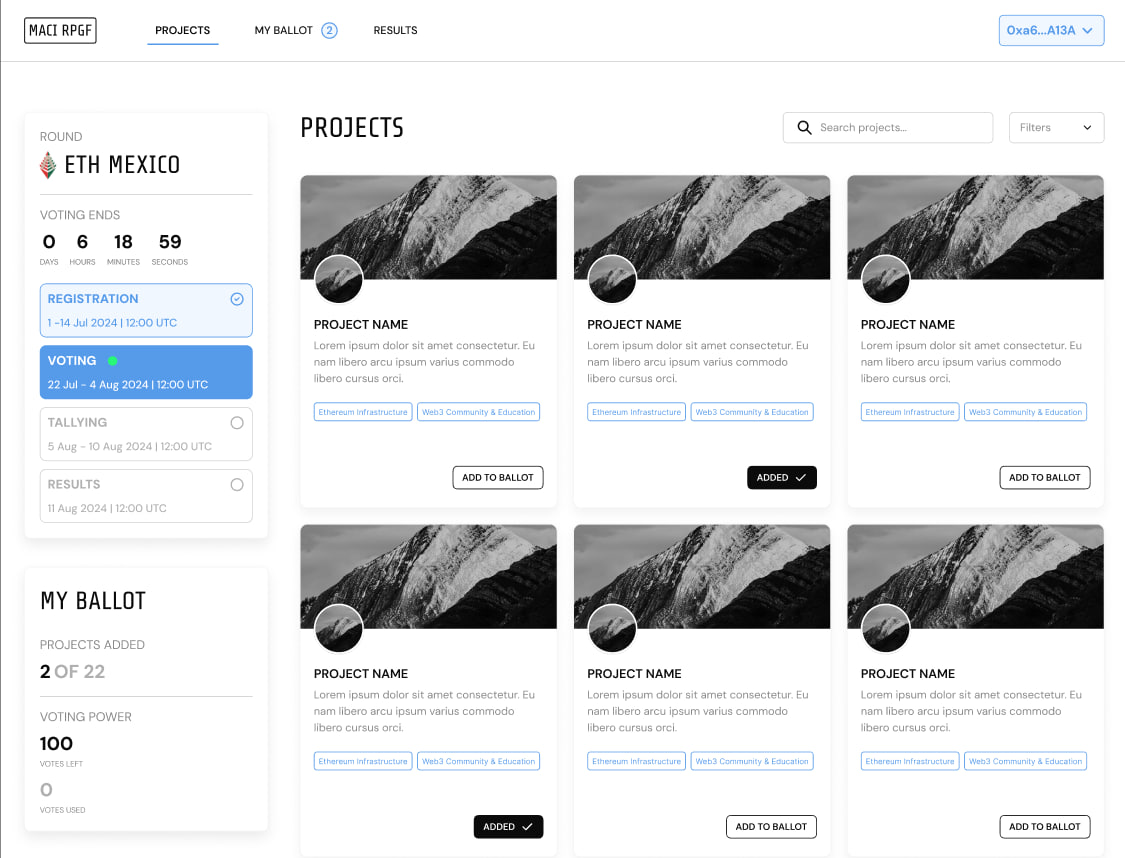Getting Started with MACI
Hey folks, we are excited to start a series of tutorials on how to get started with all things MACI, this guide focuses on installing MACI and how to deploy the contracts to a testnet.
Understanding Roles
MACI protocol has two main roles, User (Voter) and Coordinator. A simplified version would be to say that the coordinator is in charge of deploying the MACI smart contracts, inititalting the polls, allying the final results of a vote, and finalizing polls by publishing the final results on-chain. Usually the contract deployer is the coordinator, but this can be a separate role.
Requirements
Let's install the requirements first, you are going to need:
- Node.js: use a JS toolchain manager like
nvmorvoltato install Node.js. We recommend using Node 20 or above. - pnpm: Fast, disk space efficient package manager.
Installation
Now you can run the following commands to install MACI locally:
git clone https://github.com/privacy-scaling-explorations/maci.git && \
cd maci && \
git checkout v2.5.0 && \
pnpm i && \
pnpm run build
Unless you are doing a contribution to MACI, we suggest you use the latest released version. You can verify the versions here.
Download the .zkey files
MACI has two main zk-SNARK circuits. Each circuit is parameterised. There should be one
.zkey file for each circuit and set of parameters.
Unless you wish to generate a fresh set of .zkey files, you should obtain
them from someone who has performed a multi-party trusted setup for said
circuits. For more details on which artifacts have undergone a trusted setup, please refer to the Trusted Setup page.
Note the locations of the .zkey files as the CLI requires them as command-line flags.
Download test artifacts
For quickly testing MACI or trying it on a testnet we suggest using the test artifacts, using the latest dev updates you can do it by running:
pnpm download-zkeys:test
Download ceremony artifacts
For production you need to use the ceremony artifacts which have undergone a trusted setup, you can download it with the command:
pnpm download-zkeys:ceremony
Currently, the ceremony artifacts work with MACI version up to 2.x
Deploy Contracts
Before deploying the contracts we need to do some final configurations to our repository.
Set the environment variables
Head to the packages/contracts folder and copy the .env.example file.
cd packages/contracts && \
cp .env.example .env
Make sure to include a mnemonic and RPC url (make sure to replace NETWORK with the network you want to use).
MNEMONIC = "your ethereum secret key";
NETWORK_RPC_URL = "the eth provider url";
NETWORK_ETHERSCAN_API_KEY = "etherscan api key";
Generate Coordinator Keys
In order to encrypt and decrypt the messages, we need to generate MACI key pair, treat it just as your ethereum private keys, store it on a safe place as you won't be able to finish a round if you lose access, or a bad actor could decrypt the results and publish them online.
Before deploying a Poll, make sure you have set the coordinator public MACI key to which you own the private key. You can generate a new key pair using maci-cli by running the following commands:
cd packages/cli && \
node build/ts/index.js genMaciKeyPair
Set the configuration file
Head back to the contracts folder and copy the config example and update the fields as necessary:
cd ../contracts && \
cp deploy-config-example.json deploy-config.json
ConstantInitialVoiceCreditProxy
Defines how many credits will get each voter.
| Property | Description |
|---|---|
| deploy | Defines if the contract is needs to be deployed. |
| amount | Defines how many vote credits will get each participant. |
The current deployed contract has 99 as the voice credits amount.
Gatekeeper
MACI uses a "gatekeeper" contract to configure and enforce the eligibility criteria of voters who can participate in MACI polls. In other words, it is a way to allowlist signups to the system. Operators of MACI can use the gatekeeper contract to configure signup eligibility and to protect against sybil attacks in their polls. Please refer to the gatekeepers section for more information on the supported Gatekeepers.
| Property | Description |
|---|---|
| deploy | Defines if the contract is going to be deployed. |
For testing we suggest using the FreeForAllGatekeeper.
MACI
| Property | Description |
|---|---|
| stateTreeDepth | Defines how many users the system supports. |
| gatekeeper | Defines which gatekeeper will use. |
VkRegistry
Verifying key registry used for generating proofs.
| Property | Description |
|---|---|
| stateTreeDepth | Defines how many users the system supports. |
| intStateTreeDepth | Defines how many ballots can be processed per batch when tallying the results. |
| messageTreeDepth | Defines how many messages (votes) the system supports. |
| voteOptionTreeDepth | Defines how many vote options the system supports. |
| messageBatchDepth | Defines how many messages in a batch can the circuit process. |
| zkeys | Defines the path to the zkey files for QV and Non QV keys. |
The recommended values for test keys are: 10-1-2-2-1. For ceremony keys: 14-5-9-3-2.
Poll
| Property | Description |
|---|---|
| pollDuration | Defines how long is going to be the poll in seconds. |
| coordinatorPubkey | Defines the coordinator public MACI key. |
| useQuadraticVoting | Defines if the poll uses quadratic voting or not. |
Deploy MACI Contracts
To deploy the MACI contracts to a specific network you can append :network to the deployment commands, e.g. pnpm deploy:sepolia - please refer to the available networks on the package.json scripts section.
pnpm deploy:NETWORK
There are already some deployed contracts that could be reused, copy the default-deployed-contracts.json file if you need them to avoid deploying redundant contracts and save your gas fee.
cp default-deployed-contracts.json deployed-contracts.json
Delete any contract you want to redeploy and then run the following command to save gas:
pnpm deploy:NETWORK --incremental
Deploy Poll
To deploy your first Poll you can run the following command:
pnpm deploy-poll:NETWORK
Making another poll doesn't require deploying MACI contracts again, you can deploy another poll running the pnpm deploy-poll:NETWORK command and then use the updated poll-id.
Poll Finalization
As a coordinator, first you need to merge signups and messages (votes). Messages are stored in a queue so when the poll is over, the coordinator needs to create the tree from the queue (AccQueue). This optimization is needed to reduce gas cost for voters. Then coordinator generates proofs for the message processing, and tally calculations. This allows to publish the poll results on-chain and then everyone can verify the results when the poll is over. You run a merge with:
pnpm merge:[network] --poll [poll-id]
Then you need to generate the proofs for the message processing, and tally calculations, we do it with the following command:
pnpm run prove:[network] --poll [poll-id] \
--coordinator-private-key [coordinator-maci-private-key] \
--tally-file ../proofs/tally.json \
--output-dir ../proofs/proofs/ \
--start-block [block-number] \
--blocks-per-batch [number-of-blocks]
You can improve the time of the proving by including more blocks per batch, by default you can start with 500.
Submit On-chain
Now it's time to submit the poll results on-chai and then everyone can verify the results:
pnpm submitOnChain:[network] --poll [poll-id] \
--output-dir proofs/ \
--tally-file proofs/tally.json
Tally
After proofs are generated, and results tallied, the results (Tally) is written to a file. This file contains the result of a Poll. Let's take a look at one:
{
"maci": "0xd54b47F8e6A1b97F3A84f63c867286272b273b7C",
"pollId": "0",
"network": "localhost",
"chainId": "31337",
"isQuadratic": true,
"tallyAddress": "0xD4fbAF1dFe100d07f8Ef73d8c92e93d0Bcf7b45D",
"newTallyCommitment": "0x2f55cc85f7f141098ba791a9f6a646f8773b9bb4f5852ccc33b5a28e7b0756e5",
"results": {
"tally": [
"9",
"0",
"0",
"0",
"0",
"0",
"0",
"0",
"0",
"0",
"0",
"0",
"0",
"0",
"0",
"0",
"0",
"0",
"0",
"0",
"0",
"0",
"0",
"0",
"0"
],
"salt": "0x2e9cd240b86cf456fa4deced8e7420c45e3c16941d2dcec308f8b6d48264dda3",
"commitment": "0x296eac2a7289974f23497bebd39e86599d0b7032796fb84dcc1f6bbda38262ca"
},
"totalSpentVoiceCredits": {
"spent": "81",
"salt": "0x24f57b75c227987727c13d1e83409d70478b42bdc12a4a4df8129c72fbaf5aaf",
"commitment": "0xb4ebe68b0da828c0b978ddee86ba934b8e215499ac766491f236ad85fd606de"
},
"perVOSpentVoiceCredits": {
"tally": [
"81",
"0",
"0",
"0",
"0",
"0",
"0",
"0",
"0",
"0",
"0",
"0",
"0",
"0",
"0",
"0",
"0",
"0",
"0",
"0",
"0",
"0",
"0",
"0",
"0"
],
"salt": "0x2590434ea2d600f7bd2396ba7fa454ad4c975c29424ee481561d9786538a5e48",
"commitment": "0x54ec996599886da21c4b07c25d1de544292a8b7c38b79726995c869c9e95db"
}
}
We see that there is an array named results, this contains the aggregated votes for each option, where each option is represented by an index in the array. In this case above, the first option (index 0) received a total of 9 votes, where every other option did not receive any votes.
The totalSpentVoiceCredits object contains the total amount of voice credits spent in the poll. This is the sum of all voice credits spent by all voters, and in quadratic voting, is the sum of the squares of all votes.
The perVOSpentVoiceCredits will contain the amount of voice credits spent per vote option. In this case, the first option received 81 voice credits, and every other option received 0 voice credits. This is because there was only one valid vote casted, with a weight of 9. Given the quadratic voting formula, the total amount of voice credits spent is 81.
That should be all for this tutorial, feel free to join our discord for any questions or recommendations, and feel free to read our documentation for more in depth resources.

